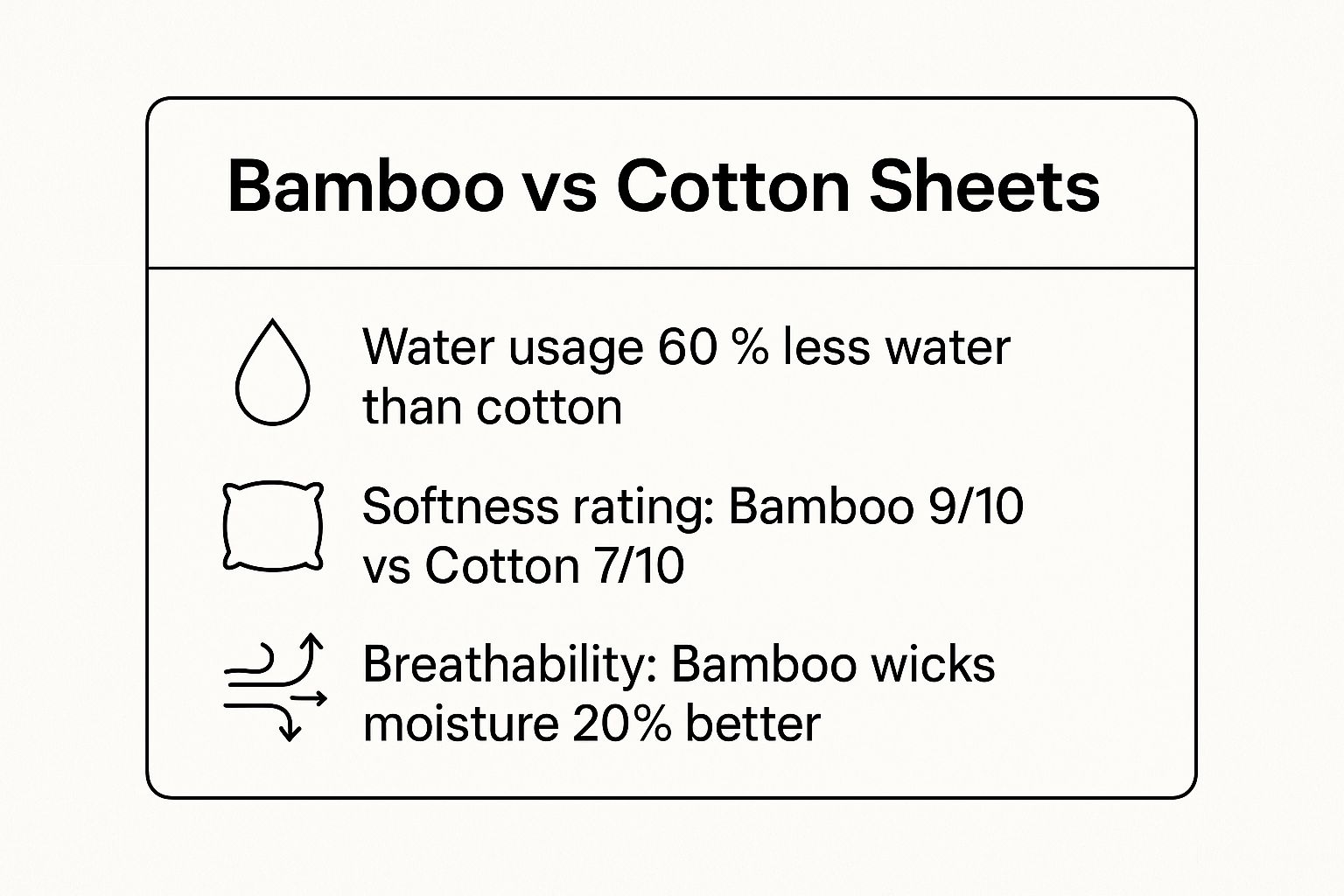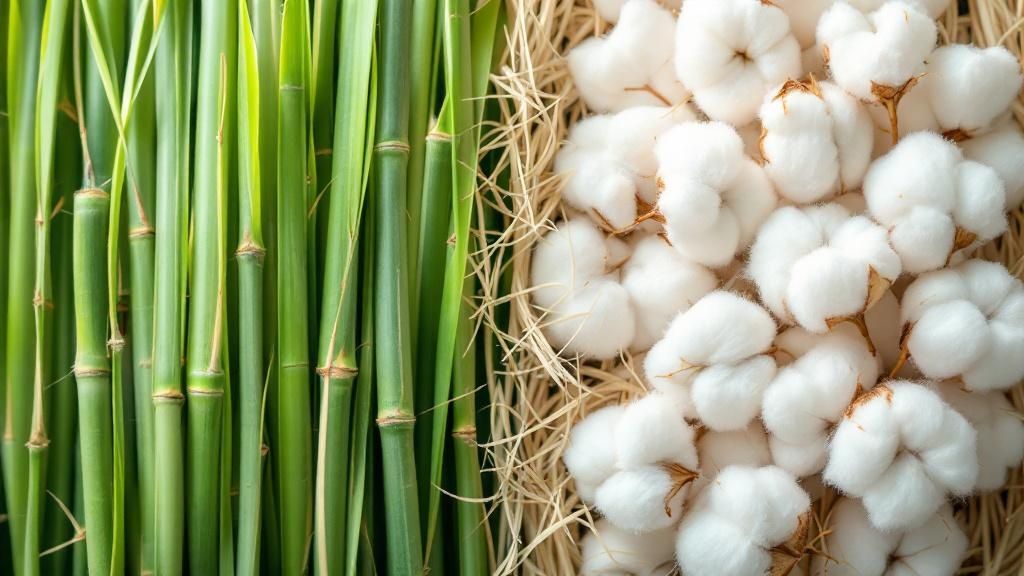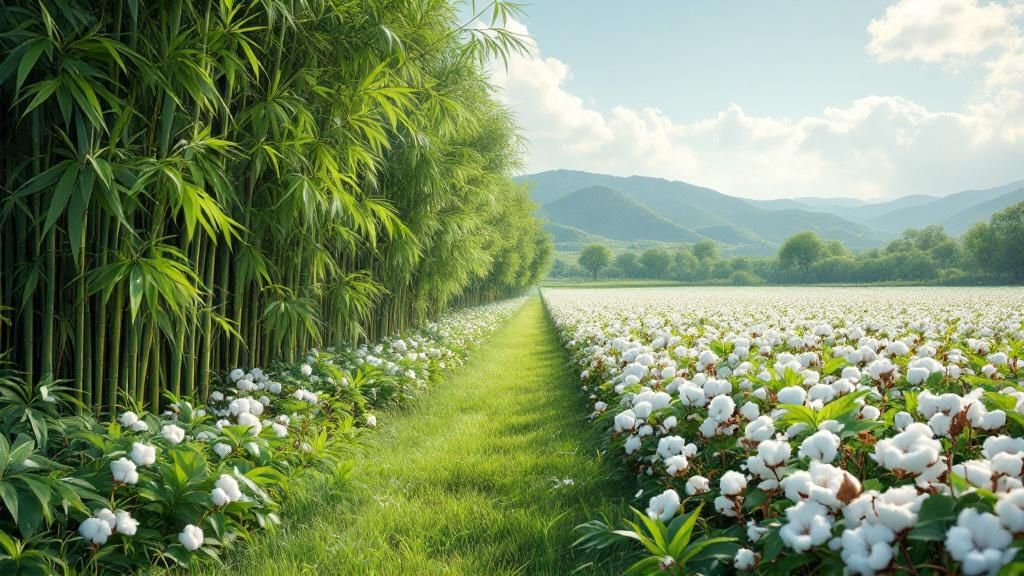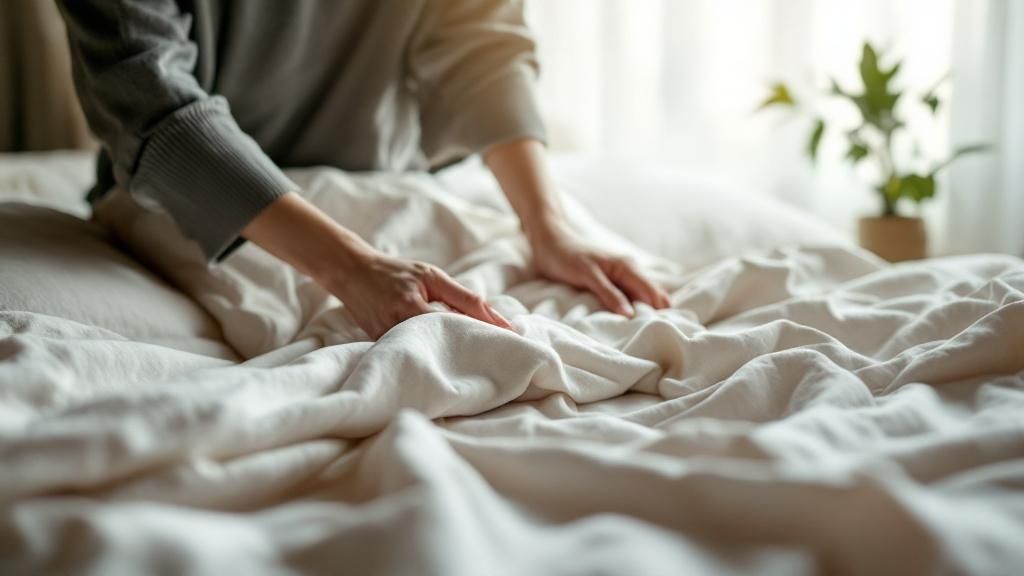Deciding between bamboo and cotton sheets really comes down to what you prioritize for a good night's sleep. If you're someone who dreams of slipping into silky, cool sheets and often battles overheating at night, bamboo is almost certainly your best bet. On the other hand, if you love the classic, crisp feel of a high-end hotel bed, you can't go wrong with premium cotton.
The Quick Answer: Bamboo vs. Cotton Sheets
So, are bamboo sheets actually better than cotton? It’s not about one being definitively superior to the other. Instead, it’s about finding the perfect match for your personal comfort, how you sleep, and even your environmental values. For most people I talk to, the whole debate boils down to two things: texture and temperature.
Feel and Temperature Control
Bamboo-derived fabric has this incredible, fluid drape that feels almost like silk against your skin. It’s exceptionally smooth, which is a game-changer for anyone with sensitive skin that gets easily irritated. This, combined with its fantastic moisture-wicking properties, makes it the go-to choice for hot sleepers.
Cotton’s feel, however, is a different story and depends entirely on the weave. You might be a fan of the light, airy crispness you get from a percale weave, or maybe the buttery-soft feel of sateen is more your style.
Sustainability and Durability
The eco-friendly angle is another huge factor for many people today. Bamboo is a type of grass that shoots up incredibly fast, needing far less water than traditional cotton and no pesticides to thrive. This makes it a compelling option if you're looking to make more environmentally conscious purchases.
This visual breakdown offers a great at-a-glance comparison of some key data points.

As you can see, bamboo has a clear edge in resource efficiency and moisture management—which is exactly why so many people who sleep warm have made the switch. When it comes to durability, both materials can last for years with proper care. However, high-end, long-staple cottons like Egyptian or Pima have built a legendary reputation for their incredible longevity.
To make this even simpler, here's a direct comparison of their main features.
Bamboo vs Cotton At a Glance
| Attribute | Bamboo Sheets | Cotton Sheets |
|---|---|---|
| Feel | Silky, smooth, and fluid | Varies by weave (crisp to soft) |
| Temperature | Exceptionally cooling and moisture-wicking | Breathable, but less cooling than bamboo |
| Best For | Hot sleepers, sensitive skin | Those who prefer a traditional, crisp feel |
| Sustainability | Highly sustainable, fast-growing, low water use | Varies; organic is better, but conventional is resource-intensive |
| Durability | Very durable with proper care | Excellent, especially long-staple varieties |
This table should help you quickly see where each fabric shines.
For many sleepers, the decision is made the first time they experience bamboo's unique combination of softness and cooling power. It's a tangible difference that often outweighs the familiarity of cotton.
Ultimately, picking the right sheets is a personal journey. This overview gives you the foundational knowledge to decide, but if you want to dive even deeper, you can explore our detailed guide on why bamboo often takes the crown.
How Bamboo and Cotton Actually Feel to Sleep On

Technical specs are one thing, but what really matters is how your sheets feel against your skin when you slide into bed. This is where your personal preference takes over, and it's where the unique personalities of bamboo and cotton truly shine.
Bamboo viscose is known for its incredibly silky, smooth feel. Think of the luxurious glide of silk, but with a bit more substance and breathability. The fibers are naturally round and smooth, creating a surface that’s exceptionally gentle. For anyone with sensitive skin or conditions like eczema, this can be a total game-changer.
Cotton's Diverse Textures
Cotton, on the other hand, is a bit of a chameleon. Its feel depends almost entirely on the weave.
- Percale: This is your classic crisp, cool hotel sheet. It's light, airy, and has that fresh, clean feeling many people love.
- Sateen: This weave creates a buttery-soft fabric that's a little heavier and has a subtle sheen. It’s cozier than percale and feels incredibly smooth to the touch.
If you’re a hot sleeper, the cool, fluid feel of bamboo can feel like a dream. But if you're someone who wants that familiar, cozy hug at the end of the day, a high-quality cotton sheet might be exactly what you need.
The real question is a matter of personal taste. Do you want to feel like you're sleeping in your sheets (the cozy wrap of cotton) or on them (the cool float of bamboo)?
This distinction is clearly influencing what people buy. In 2023, the market for sustainable bed linens, which includes both bamboo and organic cotton, jumped by a sharp 20% globally. It’s clear people want bedding that not only feels amazing but also aligns with their values, with bamboo often getting the nod for its hypoallergenic qualities. You can get an even more detailed comparison of these popular sheet types on SleepFoundation.org.
Durability and Care: What to Expect Long-Term

When you invest in a great set of sheets, you want them to stick around for a while. It’s not just about which fabric is technically "stronger"—it’s about how bamboo and cotton hold up to the realities of washing, sleeping, and everyday life.
Both materials can give you years of comfort if you treat them right. That said, high-quality, long-staple cottons like Egyptian or Pima have a well-earned reputation for being incredibly tough. Their long fibers are woven together tightly, creating a resilient fabric that stands up to pilling and wear over the long haul.
Bamboo is no slouch in the durability department either, but its silky fibers are a bit more delicate by nature. To get the most out of them, a gentle touch is key.
How to Wash and Maintain Your Sheets
The absolute biggest factor in your sheets' lifespan? How you wash them. Ignoring the care instructions is the quickest way to send a beautiful set of sheets to an early grave.
For bamboo sheets:
- Always wash them in cold water on a gentle cycle. Hot water is the enemy here.
- Skip the fabric softeners and bleach. Harsh chemicals can damage the delicate bamboo fibers.
- Tumble dry on low heat. Better yet, line-dry them if you can—it's the gentlest option.
For cotton sheets:
- Most cotton can take a warm wash, though premium cottons appreciate cooler water.
- They're generally more forgiving with standard detergents and normal machine cycles.
- Be careful with high heat in the dryer, as it can cause shrinkage and break down the fibers over time.
A Pro Tip From Experience: One of the few complaints I hear about bamboo is that it wrinkles easily. The trick is to pull them from the dryer while they're still just a little damp. Put them straight on the bed, and the residual warmth will help the wrinkles smooth out for a crisp, clean look.
If you want the full rundown, we've put together a complete guide on https://bamtekhome.com/blogs/how-to-care-for-your-bamboo-sheets that covers every little detail.
Why Do Prices Vary So Much? A Look at Cost and Market Trends

When you're trying to figure out if bamboo sheets are a better buy than cotton, the price tag is usually a big part of the conversation. I've found that bamboo bedding often hits a sweet spot—it’s typically more expensive than your basic cotton set but can be more budget-friendly than true luxury options like Egyptian cotton. The reason for this price gap really comes down to the journey each material takes from a plant in the ground to a finished sheet on your bed.
The cost of bamboo bedding has a lot to do with its unique manufacturing process. Turning tough, woody bamboo stalks into that silky fabric we love is a complex, multi-step process. It requires specialized methods to break down the plant’s cellulose into a usable fiber. So, while bamboo itself grows like a weed, the intensive production adds to the final price you see.
Cotton, on the other hand, has a price that's almost entirely tied to the quality of the fiber itself. Standard, everyday cotton sheets are made with short-staple fibers. These are much easier and cheaper to grow and process, which is why they are so affordable.
The Real Value Is in the Fibers
This is where premium cottons like Pima or Egyptian change the game. These varieties are famous for their extra-long-staple fibers, which are significantly rarer and more challenging to harvest. When you weave these long, unbroken fibers together, you get a fabric that is incredibly soft, strong, and built to last—and that quality comes with a higher price tag.
The price you pay for sheets reflects the entire supply chain. From the complexity of harvesting and processing to the rarity of the fibers themselves, every step plays a role in the final cost of both bamboo and premium cotton.
Market forces also have a say. The U.S. bedsheets market, currently valued at USD 7.75 billion, is constantly shifting. Lately, things like unpredictable weather and supply chain headaches have caused cotton prices to climb.
This has actually made sustainable alternatives like bamboo look more appealing and competitive from a cost perspective. As more people start to look for long-term value, not just the lowest initial price, understanding these factors helps you make a much more informed decision. You can dig deeper into these market trends on Fortunebusinessinsights.com.
The Eco-Friendly Debate: Which Sheet is Truly Greener?
When you’re weighing bamboo sheets against cotton, the environmental impact is a massive part of the conversation. For a lot of us, a product's eco-credentials matter just as much as how it feels. So, let's get past the marketing fluff and look at the real story behind bamboo and cotton sustainability.
At first glance, bamboo seems like the obvious champion. It's technically a grass that can shoot up several feet in a single day, all without needing pesticides or nearly as much water as traditional cotton. That kind of rapid growth and low-maintenance profile makes the raw material itself incredibly renewable.
From Plant to Pillowcase
But here’s where things get a bit more complicated. Turning a tough bamboo stalk into a silky-soft sheet isn't magic. Most bamboo fabric today is made using the viscose process, a method that needs some pretty strong chemicals to break down the plant's tough cellulose.
While modern, responsible factories can use "closed-loop" systems to capture and reuse these chemicals, it's a critical detail to be aware of when you're thinking about the total environmental cost.
The sustainability of your sheets isn't just about the plant—it's about the entire production process. Understanding this helps you look past green marketing and make a truly informed choice.
Cotton's environmental story is really a tale of two different paths. Conventional cotton farming has a rough reputation for a reason; it's famously thirsty for water and often involves heavy pesticide use. On the flip side, certified organic cotton is a much greener alternative, grown without toxic chemicals and with a focus on sustainable farming practices.
What Do Eco-Certifications Actually Mean?
To really know what you’re buying, you need to look for trusted certifications. These labels cut through the marketing noise and give you a real guarantee of what you're getting.
- OEKO-TEX Standard 100: This is your assurance of safety. It means every single component of the sheet, from the thread to the tags, has been tested for harmful substances and is safe for you and your family.
- Global Organic Textile Standard (GOTS): Think of this as the gold standard for organic fabrics. It certifies that cotton was grown organically and processed in a way that’s responsible to both the environment and the workers.
Knowing this helps you make a much smarter decision. While bamboo as a raw material is incredibly sustainable, the most eco-friendly option often comes down to choosing certified products, whether they're made from bamboo or organic cotton. If you're still weighing the pros and cons, checking out these 20 reasons bamboo sheets are better might help you with your research.
So, What's the Final Verdict? How to Choose the Right Sheets for You
After exploring all the differences, the question of whether bamboo or cotton sheets are "better" really comes down to what you, personally, need for a great night's sleep. The best sheets are the ones that fit your sleep habits, your budget, and what you value most.
Let's break it down. If you're someone who constantly kicks off the covers or wakes up feeling overheated, bamboo is likely your answer. The way it wicks away moisture and stays cool to the touch is a genuine relief for hot sleepers. Plus, that silky, smooth feel is fantastic for sensitive skin.
But maybe you're someone who dreams of that classic, crisp feeling you get from luxury hotel sheets. If that's you, a high-quality percale cotton will deliver that exact experience. For those who prefer to be wrapped in a soft, cozy hug, you can't go wrong with a buttery cotton sateen.
What If You Want the Best of Both Worlds?
Good news—you don't always have to pick a side. More and more, bedding companies are creating bamboo-cotton blends to give you the benefits of both materials in a single set of sheets. This trend is a massive part of the global blended bed sheets market, which hit a value of USD 109.12 billion in 2024.
This growth shows that people are really looking for fabrics that are easy to care for, sustainably made, and perform well night after night. You can dive deeper into the rise of blended bedding on businessresearchinsights.com to see just how popular these hybrids have become.
Ultimately, picking your perfect sheets is about checking off your personal boxes. Think honestly about how you sleep, what textures you love, your budget, and how important eco-friendly practices are to you. This simple self-check is the surest way to invest in sheets that will genuinely improve your sleep for years.
To make it even clearer, here’s who wins for different types of sleepers:
- The Hot Sleeper: Bamboo, hands down. Its ability to regulate temperature and pull away moisture is unmatched.
- The Traditionalist: Go for a premium long-staple cotton like Pima or Egyptian. You'll get that timeless crispness and durability that has been trusted for generations.
- The Eco-Conscious Shopper: You've got great options either way. Look for certified organic cotton or responsibly sourced bamboo. Certifications like OEKO-TEX and GOTS are your guarantee of a truly green purchase.
- The Budget-Savvy Buyer: While standard cotton sheets often have a lower upfront cost, high-quality bamboo can offer better long-term value because of its impressive durability.
Still weighing your options? It's completely normal to have a few more questions when you're deciding between bamboo and cotton sheets. After all, you spend about a third of your life in bed.
Let's clear up some of the most common questions we get from people just like you.
Which Sheets Are Cooler, Bamboo or Cotton?
If you're a hot sleeper, you'll almost certainly find bamboo sheets cooler than cotton. The natural fibers in bamboo are incredibly breathable and do a much better job of wicking moisture away from your body. This makes them a lifesaver in warm climates or for anyone who battles night sweats.
While a crisp cotton percale can feel breathable, it just doesn't have that unique, cool-to-the-touch sensation that silky bamboo fabric offers right out of the gate.
Do Bamboo Sheets Pill More Than Cotton?
This is a common myth, but the truth is, pilling comes down to quality and care, not the material itself.
High-quality bamboo sheets made from long fibers are just as resistant to pilling as premium, long-staple cotton sheets. It's the cheaper, short-fiber versions of both fabrics that tend to develop those annoying little balls of fluff over time.
A little pro tip from my own experience: The absolute best way to keep either type of sheet smooth is to treat them gently. Stick to a cold, gentle wash cycle and skip the high heat in the dryer. This simple habit makes a huge difference.
Are Bamboo Sheets a Good Choice for People With Allergies?
Yes, absolutely. In fact, they're one of the best options out there if you have sensitive skin or allergies.
The fibers in bamboo are naturally smooth and round, so they're far less likely to irritate your skin. On top of that, bamboo fabric is naturally hypoallergenic and resists common troublemakers like dust mites and mildew, which can help you breathe easier all night long.
Ready to feel the difference for yourself? Bamtek offers 100% organic bamboo bedding designed to give you that cool, silky-soft sleep you've been dreaming of. Explore the Bamtek collection and see what you've been missing.










